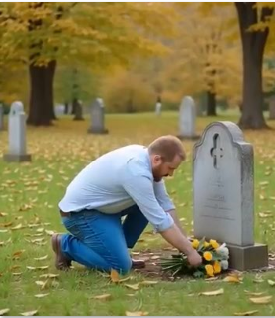
A year had passed since my husband Owen’s death, and every 15th I visited his grave. Each time, fresh flowers
were already there—tulips, daisies, lilies—arranged with care, as if by someone who knew his favorites. Curious,
I went early one morning and asked Amos, the groundskeeper, if he knew who it was. He nodded: a man in his
thirties came every Friday, quiet and respectful. Weeks later, Amos sent me a photo. My heart sank—it was Silas, my son-in-law.
That evening, I confronted him. Silas admitted he had been leaving the flowers for a year. Through tears, he revealed
his secret: on the night Owen died, Silas had called him drunk, asking for a ride. Owen left to help,
and the accident happened. Silas had carried the guilt alone, visiting the grave weekly to apologize and share updates about life.
I told him gently, “Owen chose to help because he cared. His death isn’t your fault.” Ivy, my daughter, wrestled with anger and grief
but eventually found peace as Silas sought therapy. Now, our family visits together. Even my grandson Jude places flowers,
honoring the man who shaped us all. The flowers became symbols of forgiveness, love, and Owen’s enduring presence.